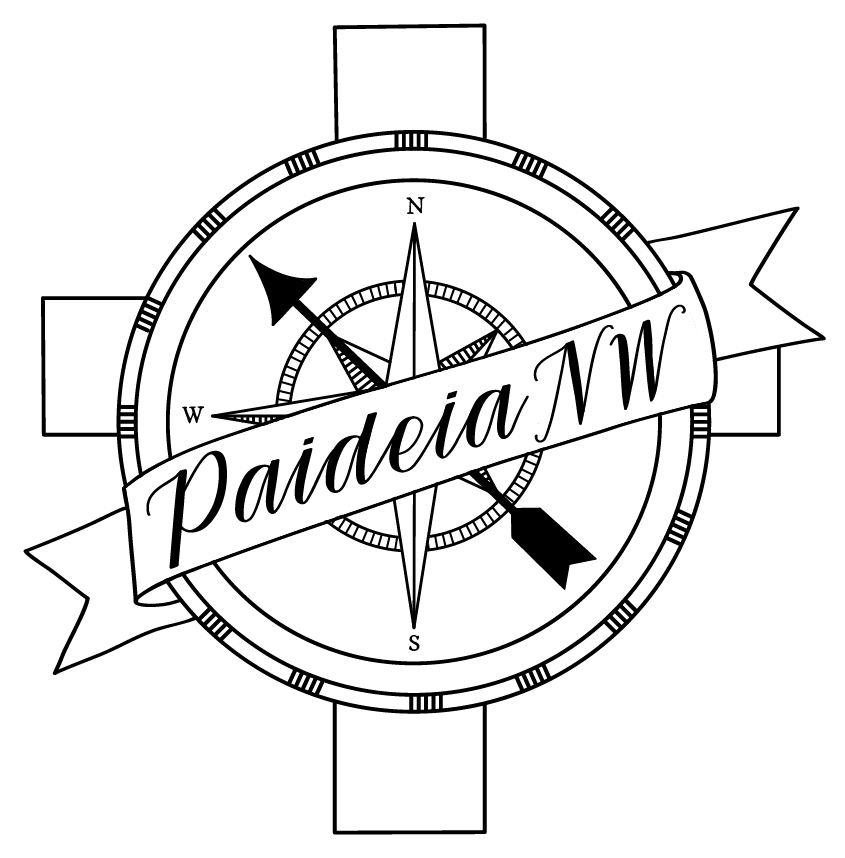Paideia Conversations, Ep. 12
After a bit of a winter rest, Melissa Cummings is back to converse with Jenn Discher from Paideia Southeast… and not just because she often cohosts Paideia Conversations. Jenn Discher recently published her first novel, The Elk King, and Melissa wanted to know all about it. Here at Paideia Conversations we talk a lot about cultivating a particular atmosphere in our homes and families as we live and raise kids for the kingdom of God… and this is a new way that rubber can meet the road. How did Jenn cultivate the culture of Animalia while simultaneously cultivating Discher culture at home? Where were the overlaps? How did she incorporate her family into the project? How did language and naming things in the book come into culture-cultivating? And what was the process like to coordinate the visual elements of culture with her illustrator? All of this and more… join us now for this conversation!
Resources and Links
The Elk King, available on Amazon in digital & paperback
Blog post explaining “why elk?”
World Elk Calling Championship Competitions
The Hidden Art of Homemaking by Edith Schaeffer
The Winter King by Christine Cohen
The Wingfeather Saga by Andrew Peterson
Letters from Father Christmas by J.R.R. Tolkien
Transcript
Melissa: joining me today is my cohost from Paideia Southeast, Jenn Discher. She also happens to be today’s guest. Please join me as I get to chat with Jenn about her brand new novel called The Elk King, Tales from Animalia, Book One.
From the Original Histories of the Elk, Volume One:
The words of Henoria, Owl Prophetess to the Elk of Glenariff.
In honor of King Argyle’s sacrifice and the Provision of the Great Sequoia.
The Elk shall drink water only from its cistern as far as it depends upon them, the Elk shall shun all other water. It will be durmwat to them.
In faith did Argyle make his sacrifice and, if faithful to the ways of the Elk, the Elk shall be a blessed herd. The ways of the Elk are simple but true: protect the weak, live nobly, and be filled with what is good. But if the Elk prove faithless, be warned. They shall incur a fate more terrible than that from which Argyle saved them.
This water is pure, good, and true. Drink of it and be so yourselves noble Elk.
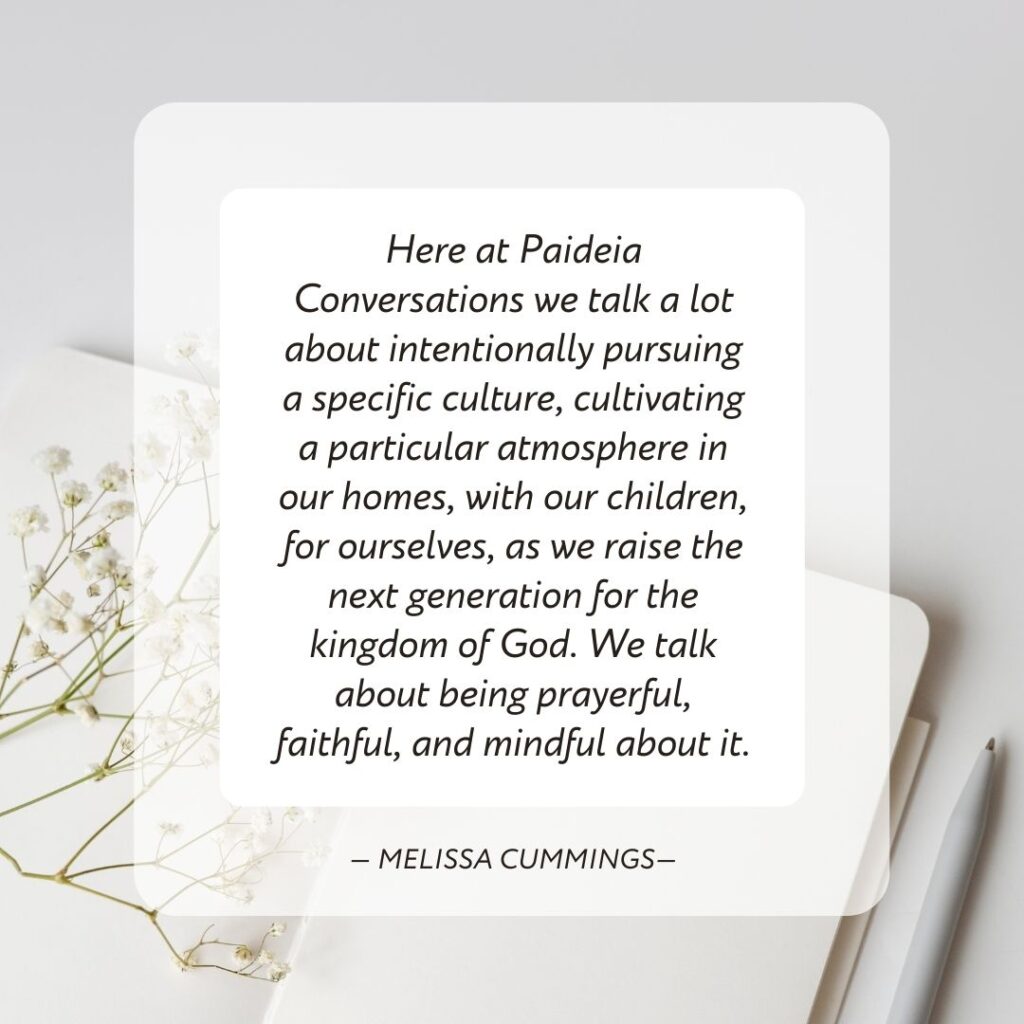
Here at Paideia Conversations we talk a lot about intentionally pursuing a specific culture, cultivating a particular atmosphere in our homes, with our children, for ourselves, as we raise the next generation for the kingdom of God. We talk about being prayerful, faithful, and mindful about it. So how does this apply to the idea of being an author of some new middle grade fiction? Well, let’s find out what Jenn has to say about that.
Oh, there you are!
Jenn: oh good morning, hey!
Melissa: okay, number one.
Jenn: okay.
Melissa: I’m so excited to have this in my hand, instead of just as a… what was it, a PDF?
Jenn: a PDF, yeah.
Melissa: nothing against digital… Okay, actually. Something against digital.
Jenn: right.
Melissa: but like, even though my husband… we own and he runs, you know, a digital Bible reading company, right? You’d think that I would be okay with digital reading of things. No, not so much. I could get through the paperback version probably in a snap, right? Because it’s the kind of thing where the kids would say, oh just one more chapter! oh just keep going! just turn the page and keep going! For some reason, even though it’s the exact same words, the exact same story, no matter what the book is – whether it’s, you know, C.S. Lewis or missionary biographies or, you know, a story like The Elk King, or even, I don’t know, the book of Genesis – it’s so much harder to keep the momentum when it’s digital.
Jenn: mmm, that’s interesting.
Melissa: I don’t know. I don’t know why. But my kinds seem to follow me in that. So having the paperback finally is like, ahhh! here we go! So instead of reading it in a more choppy version like I did with the electronics where I’m like, okay, I can’t even, because my eyes! I can’t look at a screen anymore…we’re going to revisit this in paperback version. And we’ll just, we’ll keep going. So anyway. I’m so excited.
I love how you have, in the back, you have the Glossary and you have… where’s the cast… Oh there you go. Cast of Characters. I’m kind of really super tempted to ask you to like read the Glossary for me. [laughter]
Jenn: I don’t have it in front of me, so that would be – and I don’t have – it’s not been part of my memory work, so I can’t rattle it off.
Melissa: well it should be! There you go. This should be part of your memory work!
Jenn: honestly, you could probably ask me about a character at this point and I’d be like, wait, hold on a minute. [laughter]
Melissa: like… haroo harrah! I’m like, I don’t know if I pronounce that right! Right?
Jenn: it’s great, it’s great. [laughter] It is. That’s how I would imagine pronouncing it.
Melissa: garoo garoo… well, is the emphasis on the gah or on the roo?
Jenn: that’s a good question, yeah. That’s fair.
Melissa: so this is why, okay, I need you to narrate the audiobook. [laughter] In fact, okay, so The Winter King by Christine Cohen…
Jenn: yes.
Melissa: …who is another friend of mine with these odd connections from like when I was a teenager, and she does the narration for the audiobook of her The Winter King, and it’s so helpful. Because I’m like, oh, okay, that is exactly how it’s supposed to be pronounced! Or Andrew Peterson with The Wingfeather Saga.
Jenn: yes.
Melissa: it just makes so much sense. I love it when an author speaks the words and the characters’ names, and it just really helps me get in that culture. Because sort of like I could read Spanish or… mmm, I don’t know… could I read Swedish, Icelandic? Probably not. You know, I could look at the letters and try to sound it out but I’d be totally butchering it. It’s not until you converse with someone from that culture that you really get a taste for, what does it sound like?
Jenn: yeah, I hear you.
Melissa: so anyhow, that’s what this book makes me… makes me think of. It makes me want to know more. It makes me want to jump into that culture. And that’s why I thought, this is the perfect thing to talk to you about today, because it’s – it’s about culture, and yet, it’s not about the culture that we normally talk about.
Jenn: right.
Melissa: okay, that said. Jenn Discher lives in North Georgia with her husband and three adventurous kids. She likes exploring, reading aloud in bad accents, and serving as Secretary to the Tooth Fairy. I love that bio, by the way.
Jenn: yeah. [giggling]
Melissa: super fun. But I need you to tell me… why The Elk King? And then I’m going to ask you all these culture questions.
Jenn: yes, yes! Well, why The Elk King? Partly because I’d always wanted to write a children’s book, and I’d always specifically wanted to write a talking animal story. And then, why elk spec… I had never intended to write a story about elk specifically. That was a bit of a surprise. I was going on a hike with my husband, and we happened to, we kind of stumbled, almost literally, into a herd of elk. And he made a comment, like an offhanded comment, about them, that for some reason just sparked an idea in my head. And the words, “that would make a great children’s book” came out of my mouth. And instead of looking completely askance at me, he was like, “what do you mean? tell me about that.” And so I, to my own surprise, I all of a sudden could tell him about that. And these things just started coming out of my mouth, and worlds and characters and plot stuff just kind of started coming. And so we kept talking about it and kind of went from there. So, yeah.
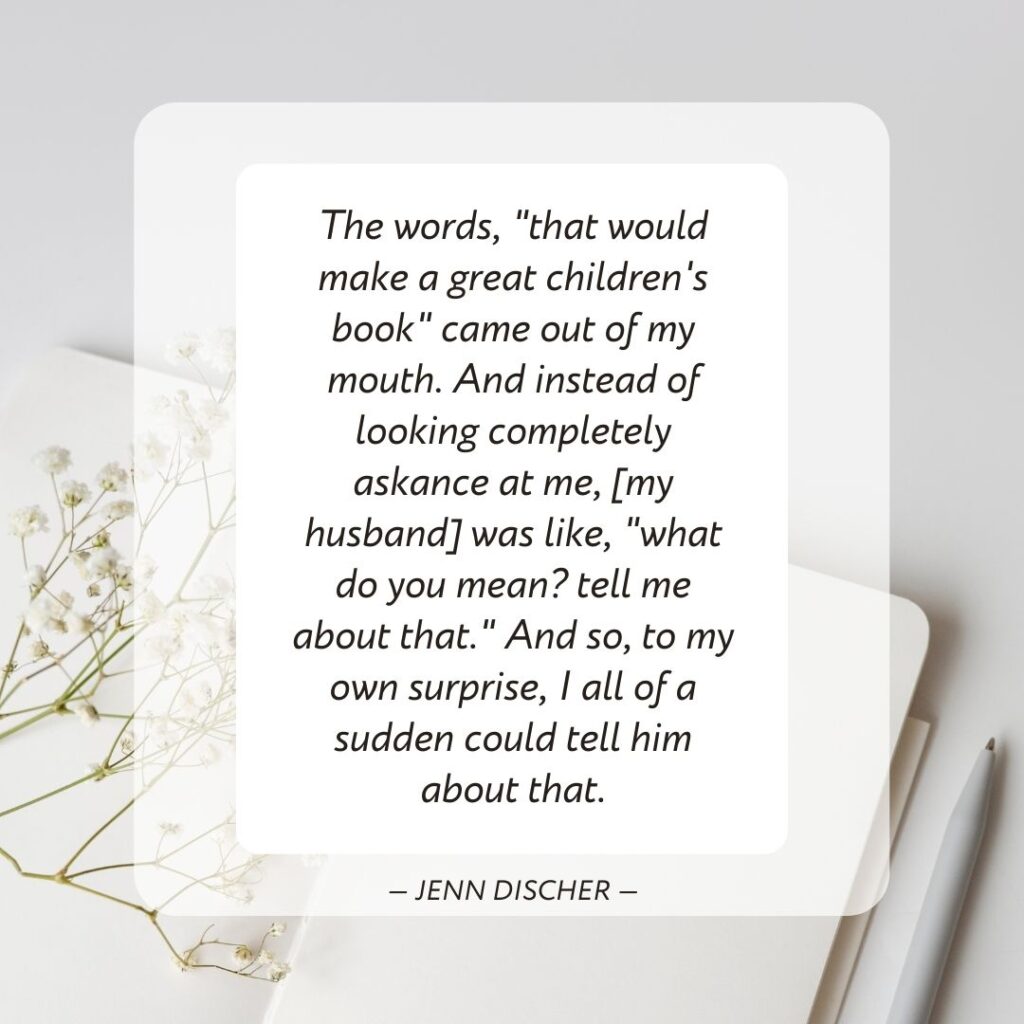
Melissa: aw, while you were on a hike with your husband!
Jenn: I was, yeah! Yeah, we were. We were on a rare trip just the two of us, and it was a coastal California hike. Yep.
Melissa: and he just asked the right question at the right time.
Jenn: yeah, well he was kind of like, what do you mean? what did you just say and what do you mean by that? And so then we… yeah, he said something like… I wrote a blog post about this actually, so the fuller version is online somewhere. But I think he said something like, well that’s a herd of elk that’s gone soft. Like it’s almost like they’ve forgotten they’re a herd of wild animals. Because you could approach them. We had been told at breakfast that morning that, “oh you might – if you go hike over here, you might run into a herd of elk.” And I thought, what? no, that won’t happen. They wouldn’t let us, you know, get that close. And having no experience with elk whatsoever, these were my assumptions about elk. And but we were wrong. They were really used to humans because it was a, like kind of a preserve area. Not a preserve but a national seashore kind of protected area.
Melissa: oh that’s interesting.
Jenn: yeah.
Melissa: okay, so were there any male elk with an amazing rack?
Jenn: huh, there were male elk. The, yeah, the antlers, not maybe as dramatic as they’re pictured in The Elk King. But, and the time of year I guess, I guess it was summer so yeah, they wouldn’t have been full grown I guess yet anyway.
Melissa: okay, so it wasn’t rutting season? They weren’t bugling for you?
Jenn: no, they weren’t. I didn’t even know they bugled. I didn’t know any… I literally didn’t know anything about elk when I started writing. I didn’t know they bugled. I didn’t know there were bugling competitions where men got up on stage [laughter] and practiced bugling or performed. Didn’t know that! That’s pretty cool.
Melissa: [laughter] That’s a random piece of info right there, yeah.
Jenn: google it!
Melissa: so when I was… how old was I? I was probably twelve… my family went to Yellowstone National Park, and it was in like late September early October – because that’s when homeschoolers really like to travel. After all the other kids are back in their schools, we get to hit the cool places. And I remember hearing elk bugling and thinking it was the strangest, most amazing yet ghostly kind of sound. And that was about a year before my family ended up buying property in a town by the name of Elk. And so ever since those two experiences, I’ve been fascinated by elk. So I particularly love that you stumbled on The Elk King.
Jenn: yes, that’s awesome.
Melissa: I think that’s fun. So intentionally pursuing a specific culture. We do that because we know that we are going to cultivate one atmosphere or another, whether it is intentional or accidental.
Melissa: so we believe as we pursue an intentional culture we need to be prayerful, faithful, and mindful about it. But what I’ve been pondering is this idea that you’ve been, for how long? How long have you been working on writing this book?
Jenn: umm, the writing was maybe about twoish years, and there was editing and all kinds of stuff after that. So maybe about four and a half years total.
Melissa: yeah. And the ages of your kids: remind me.
Jenn: so when I started, they were quite young. They were seven, five, and two. And now they are almost twelve, ten, and seven.
Melissa: yeah, okay. So while you have been working on intentionally pursuing a specific culture in your home, raising your babies for Christ, you’ve also been cultivating this other, entirely different kingdom and culture that came out of your imagination and you’ve been crafting it there and putting it down on paper! You’ve been living in two worlds. [laughter] And I find that fascinating! That’s where I just want to hear, what is that like and where do you see cultural overlap between those two? Between your home and family and Christian, Georgian culture – and then the culture that you created in Glenariff… how do you pronounce it?
Jenn: Glen-AR-iff. I would say Glen-AR-iff.
Melissa: well then, that’s the right way to do it. Glen-AR-iff. Okay. So where do you see those overlaps? Or do you see those overlaps?
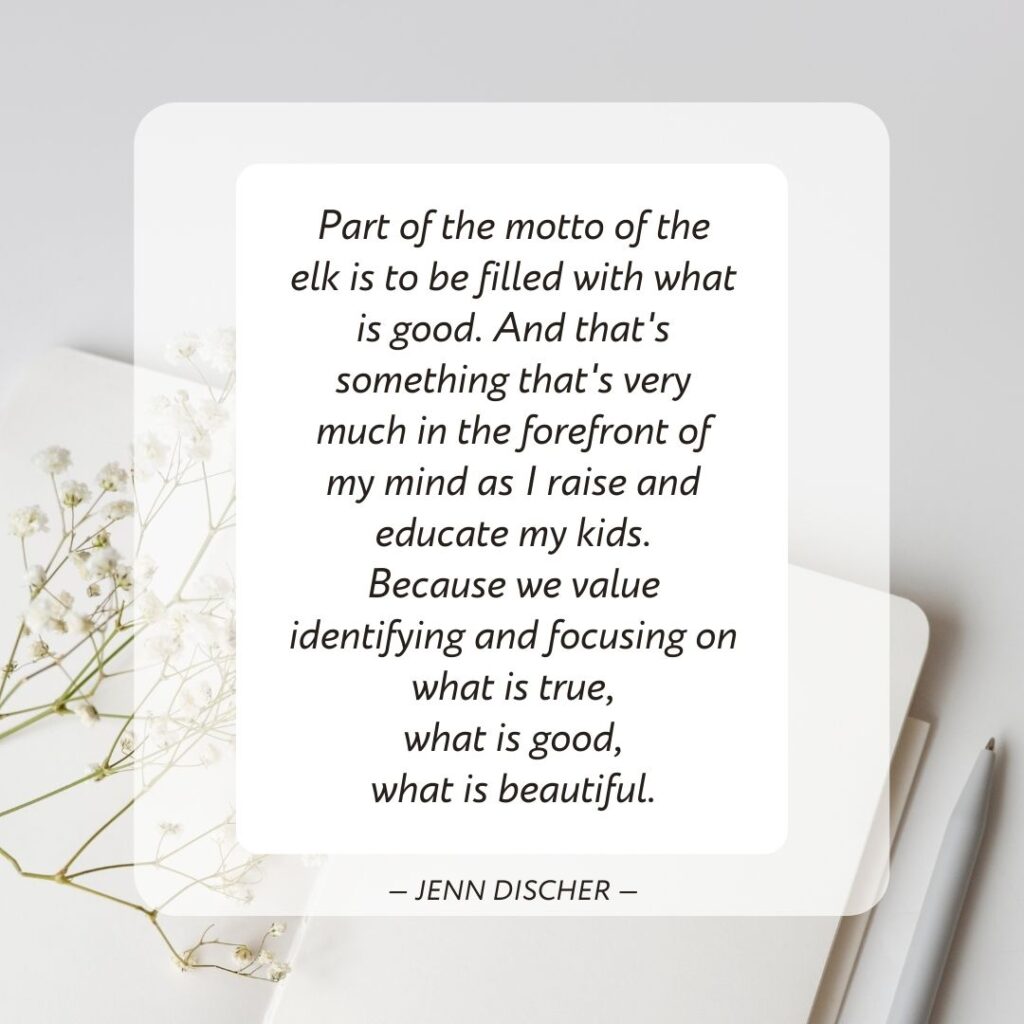
Jenn: yeah, I – and I think there would have to be overlap, because I’m creating out of my own… well, my own head. But also my own worldview, like values and all that. So I think there would be overlap. But not, you know, not in every way obviously. Specifically with the elk, they are like the chief creatures of Glenariff. And the specific overlap I’d see there is that, in terms of values probably, like the, part of the motto of the elk is to be filled with what is good. And that’s something that’s very much in the forefront of my mind as I raise and educate my kids. Because we value identifying and focusing on, you know, what is true, what is good, what is beautiful. Another Way of the Elk is to live nobly and protect the weak. And so there would maybe be overlap there in terms of, in my home like I desire to live sacrificially, to consider the interest of others, to defer – we talk about deferring to those who are younger and honoring those who are older. I wasn’t explicitly thinking of this verse when I wrote the Ways of the Elk, but they do kind of remind me of Micah 6:8 where it talks about, what does the Lord require of you but to do justice and love mercy and walk humbly with the Lord your God. So, yeah, so maybe the terminology… like I don’t explicitly say to my children to live nobly, but the underlying value there I think is present.
Melissa: so one of the things that is such a big part of culture in general is naming, right?
Jenn: mhmm, mhmm.
Melissa: and I think that applies to pretty much any culture at any time or in any location. Naming our children, naming streets, naming… I mean… in the Bible, that’s one of the first things that Adam is given to do, right? It’s to name things.
Jenn: right.
Melissa: and when a child is born, whether now or two thousand or six thousand years ago or whatever… naming a child has always been a big thing. Creating a title for a book, creating a name for a home, right? In a lot of children’s literature I think there are very creative names for places, and it can be as simple as Spare ‘Oom [laughter] and yet that’s naming something. So in creating and nurturing and sustaining a culture, that’s a big piece of that puzzle. So tell me about naming the places and the characters in your story. And particularly what about how you came up with… I mean, you didn’t even use English words, right? [laughter]
Jenn: haha, right! Is it easier that way? I don’t know, maybe!
Melissa: only if you tell me how to pronounce them!
Jenn: [laughter] Mmm, I’ve always liked naming things. I like my kids’ stuffed animals. I get kind of a kick out of it. I would do it for them, you know, before they could talk. We would use like rejected baby names for the kids’ stuffed animals [laughter], and then as they got older, they would come to me and be like, Mom, what does she look like? And I’d be like, oh she’s clearly a Mathilda or whatever. So it is something I enjoy. And where did they come from? They… so, Tolkien talks about this idea of the leaf mold of the mind. Meaning like, just things go in and they sort of decompose and turn into, I don’t know, like fertile soil. Or maybe I’m taking the metaphor too far. But basically it’s like this idea of a depository of everything you’ve seen and read and listened to, and so anything I named I guess came from that. Like books I’ve read, picture books, travels, people I know, places I love, cultures I have an affinity for… and so…
Melissa: and so cultural norms and customs related to language… how is that, or how do you think you may have expressed that in The Elk King? Sort of establishing cultural norms through the use of language?
Jenn: yeah, that’s an interesting question. So the passing down of the male royal elks’ names would be one custom. And I didn’t make that explicit in the book, so that’s not spoilery at all. I didn’t spell that out. It’s just what I did in my head when I was parsing through the family trees. And I didn’t create a whole language for the elk or any of the other creatures. But I did create certain terms to name certain aspects of their culture. Or to name, like, commonly used… I don’t know… expressions. So, for example, like, dermwat for the elk is… and for really any of the free creatures of Glenariff… is water not from the great cistern. So they have this great cistern: that’s where they’re supposed to go to get their water. There’s a whole backstory to that for why they’re supposed to do that, and so they just name any water that’s not from the great cistern is dermwat.
Melissa: and that’s right in the beginning, isn’t it?
Jenn: mhmm, yeah.
Melissa: okay yeah, so, that’s right from the getgo.
Jenn: yeah. Then there’s distinctions for… so, for the male and female elk. They’re talhorns and talhornas to designate fully grown male or female elk. And then you have nadorns and nadronas for the young male and female elk. And that transition from nadorn to talhorn happens when their horns are fully grown. Yes, I know elk have antlers, not horns. [laughter] But in Animalia they have horns, and there’s a reason for that too. There’s a backstory there. They did, historically, have antlers. But at one point they transitioned to having horns. Which, the difference, for my purposes, the difference – the main difference is that they keep them for life. I should also say, they don’t continue growing. They do stop at some point. Because in real life, I think, I don’t know if this is true for all species that are horned. But like, I think the big horned sheep, like I think their horns keep growing and growing and growing until – and I think that’s actually what kills them. It’s kind of awful. They just, like, the weight of it. So, I don’t have that…
Melissa: like Texas Longhorn cattle or something I’m envisioning…
Jenn: no, like sheep! Well, I think…. Well we were in the Grand Canyon last summer, and we saw the Bighorn sheep and my kids pop off with this trivia about them that they got from a nature show. And it’s, yeah. So that’s not happening in The Elk King. Their horns reach a certain point and stop growing. But, and then back to the language, that those terms kind of distinguish when they’ve come of age, I guess. That naming. They get a new name when they come of age there. And then there’s a Glossary in the back of the book of elk and smaller creature terms, and them some various bugles. So there’s a couple of terms for, that come out of rabbit culture and sparrow culture that I had fun with. They just… and like floptrust for a rabbit is like to just be paralyzed with fear, and when a bird, when a sparrow goes paddywhomp they’ve just grown limp, they are limp from lack of nourishment or something. So just, I mean, some of it was just fun. Fun to do. It was fun to kind of create those words that… sort of like those, I feel like there are those words in German that express a feeling that we need multiple words for in English. That was a fun part of it.
Melissa: have you started using those words or phrases in your family culture now? Every day language?
Jenn: what’s funny is that [laughter] my husband has, actually!
Melissa: I love that!
Jenn: he’s more prone to it! He’s like, are you floptrust? [laughter] And I’m like, I might be actually! So yeah.
Melissa: oh that’s great. One of the things I love about this being only book one is that you really drag us into the entire culture right from, at the beginning with the map, and then like you mentioned at the end, the glossary and… oh I said I was gonna keep it closed, didn’t I? Well but anyway, from front to back, it’s showing this culture, and it’s so encouraging that, oh hey, if it’s only book one, then getting to know this culture right at the getgo with the map and learning the glossary at the back, regardless of the story, right, that makes you want to know, well what’s next? Where’s book two? What’s coming? But even just those little, I don’t know… teasers?… of the culture – I want to explore the map more, I want a bigger glossary, I want all of that. So, but the map made me think, there are other aspects of cultivating a culture than just, you know, language or naming. A lot of atmosphere is impacted by visual presentation and then preservation. So how was it to work with your illustrator, especially thinking about this map, which is fantastic.
Jenn: Yeah, it is. Yeah, I love the map.
Melissa: but Jessica Evans… and I’ve… I have some of her picture books and so you’ve… how did that work? How did you get connected with her? And then what was it like to work with her? Did it take stress off your plate? Did it, I don’t know, was it a nerve-wracking leap of trust? It’s like trusting her with translating this culture that you’ve created, that she’s going to put into visual elements, she’s going to show us visually, you know, a picture of Glenariff and Draven, to solidify the Animalia culture for the readers. But how was that for you, essentially passing that off to someone else? What was that like?
Jenn: it was, it was great, honestly. Like, it was just a total dream to work with her. She’s the best. I wasn’t nervous really at all about her, like, visually translating the story. Probably for two reasons. One being, I was pretty familiar with her work before I reached out to her about The Elk King. I’d seen her work, you know, on social media and on her website and in her books. And I loved it. And I especially liked her depictions of animals. I knew her a little bit from interacting on social media. I knew we liked a lot of the same books. And then probably the second reason is that, that it, you know, there wasn’t that nervousness, was that when I sent her the manuscript, she really just happened to connect with the story. She was really encouraging about it, and I remember telling my husband, “I don’t think she’s just being nice, I think she really likes it.” And he was like, “yeah, I think she does.” Which was just kind of mind-blowing for me, because I had sent it around to beta readers, and I had, you know, I had people I didn’t know read it.
Melissa: that’s so fun.
Jenn: yeah, yeah it was. And she really captured, I think I was even, I think I was surprised by how well she captured the characters. Because she just was like spot on.
Melissa: I’ve never thought about what it would be like to be in our shoes as an author, and then having an illustrator take my words and turn them into something visual.
Jenn: yeah.
Melissa: but I’ve experienced it in a consumer format. If I’ve read a book, for instance, and I have these images in my head of what the characters look like or what the landscape looks like, and then I see a movie… Do you know how many characters, like what number of characters she ended up sketching for you?
Jenn: I think thirteen or fourteen. I forget, yeah.
Melissa: more than a dozen though, essentially.
Jenn: more than a dozen, yes. Yes. She got some of the bad guys, too. Which was, it was fun to see.
Melissa: I love how you’ve shared them on social media, too. Little ways to, again, visually draw people in and entice them into that story and the culture. It’s really fun. So how has the journey of becoming an author impacted your typical routines of homemaking and homeschooling, and how have you been able to incorporate your family – your children, as well – into that process? And did you keep the story sequestered from them until it was closer to a finished product, or did you involve them the whole way?
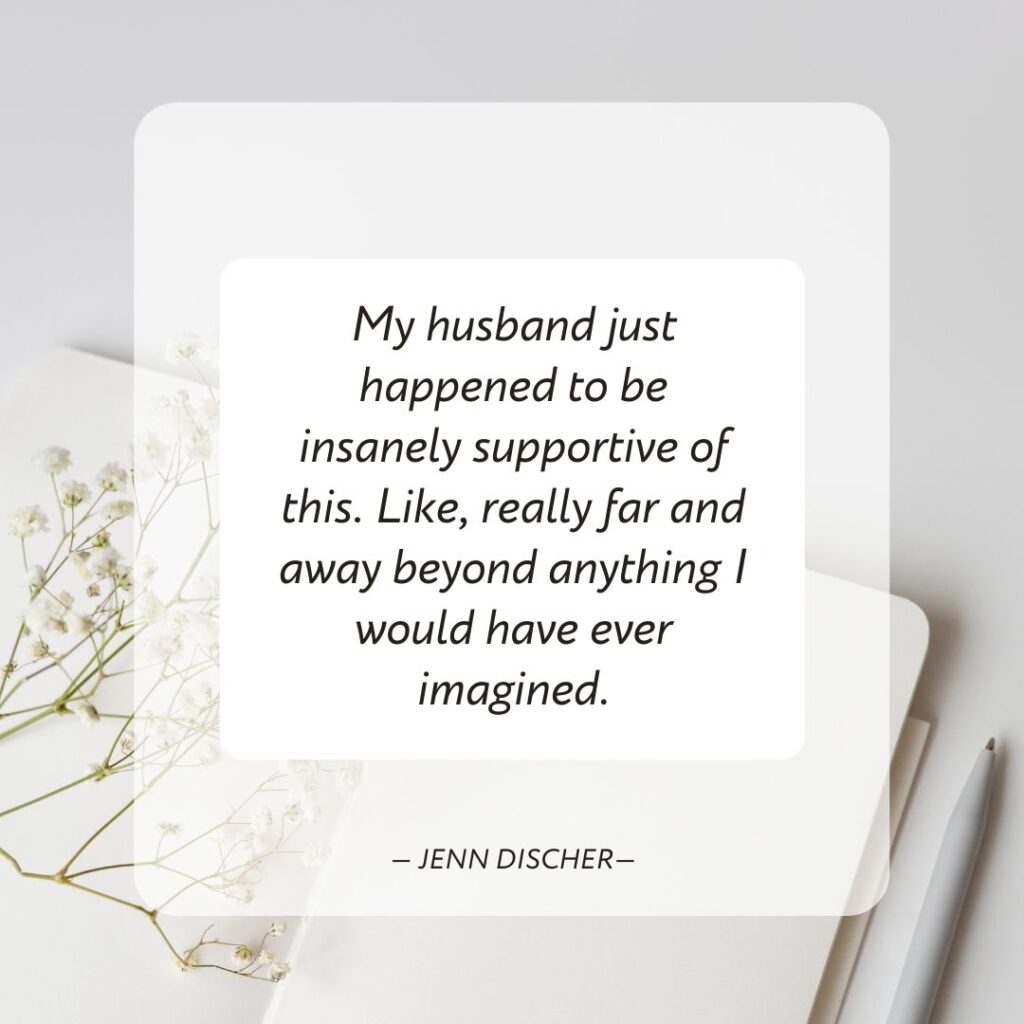
Jenn: so I should probably say at the outset that my husband just happened to be insanely supportive of this. Like, really far and away beyond anything I would have ever imagined. I mean, I didn’t really have any expectations when I got started, but so he really was invested in this from the beginning and so we kind of sat and he would help me sit down and kind of navigate the family schedule to find writing time. Because it just sort of became a project that was a priority, I guess, for us together. And therefore for our family. So yeah, so he helped me make it a priority. He was my first beta reader, my first editor, plot untangler, would talk through stuff with me. And my kids were quite young when I started it; they were seven, five, and two. So it was almost easier then. I did kind of keep it sequestered from them, because it wasn’t… not like, I mean… just because it wasn’t super relevant to them. They weren’t even strongly reading yet. I mean, two of them weren’t reading at all, one of them was newly reading.
Melissa: sure.
Jenn: it was kind of beyond their level, too. So we set it up so that it wasn’t really impacting our, my homeschool time or my homemaking. I mean, homeschool time was not taking a lot of time in that season of life, too. I would write either after they’d gone to bed or during their afternoon rest time, about once a week I’d go out of the house to write for a longer stretch. And we just had to be kind of creative and flexible with that. My husband would work from home one day a week but it would, the day would change, so it would be like, okay, well I’m working from home tomorrow, so you can go out to the coffee shop then and have a chunk of time. Or sometimes I’d get up early on a Saturday morning and go out and write. So it didn’t impact generally speaking our typical routines. It just, writing sort of just became my one big extra, or my one hobby. There were other things that I was probably saying no to. I’m, off the cuff, thinking of things like, you know, watching shows in the evening or extra reading time or something like that. But that didn’t feel usually like a big sacrifice, I was enjoying the project and excited about it. And then also as a family, we didn’t have a lot of outside commitments in that season with the kids being younger. As they got older, I would occasionally read the older ones bits of the manuscript, but other than that, they weren’t really incorporated into the process until I got into final edits. And then they were super encouraging and actually really helpful. My daughter has a good eye for detail, and found some straggling edits that needed to happen there at the end.
Melissa: so what was the response of your children when they got to see… or maybe when they actually got to hold the first copy in their hands? To see their mama’s name on it!
Jenn: yeah, it was super, they were super excited. They’ve been so sweet. They’ve been really, really encouraging. And they’ve prayed for it, and they’ve just been excited, yeah, super interested and excited. There’s a, I have a free download for a coloring sheet, Elk King coloring sheet on my website, and I think my seven year old has done like twelve of them. He just keeps doing the same coloring sheet, bless his heart, over and over! I’ve never seen him color like that before. [laughter]
Melissa: and each one is probably different, right?
Jenn: each one is different, yes! Very, very boldly colored. They’re great.
Melissa: my ten year old did one a couple weeks ago, and it’s been up on the fridge, and he did the… oh, what are the trees in the background?
Jenn: oh they’re aspens.
Melissa: aspen, okay. I was going to say birch, I knew that wasn’t right.
Jenn: yeah, I’ve actually probably called them that at one point, too.
Melissa: yeah. So he colored each one, like it looks like a rainbow backdrop.
Jenn: oh, that’s cool. I want to see that!
Melissa: I’m like, why? [laughter] I should do that. So that has been a fun aspect, too, is having something tangible like that to color. Actually, the map… and of course I wouldn’t let them actually color the map in the book… but he wanted to color the map. I’m like, well, I guess we could photocopy it and blow it up on a piece of paper, and then you could. He wants to like map it out.
Jenn: that’s fun!
Melissa: that’s my ten year old for you.
Jenn: yeah. I had fun with… I had to draw a map as part of the writing process just for me to kind of visually orient myself. So it was really fun to see her, like I had to give her like my little chicken scratch map, and then she made it beautiful. But yeah, I like maps.
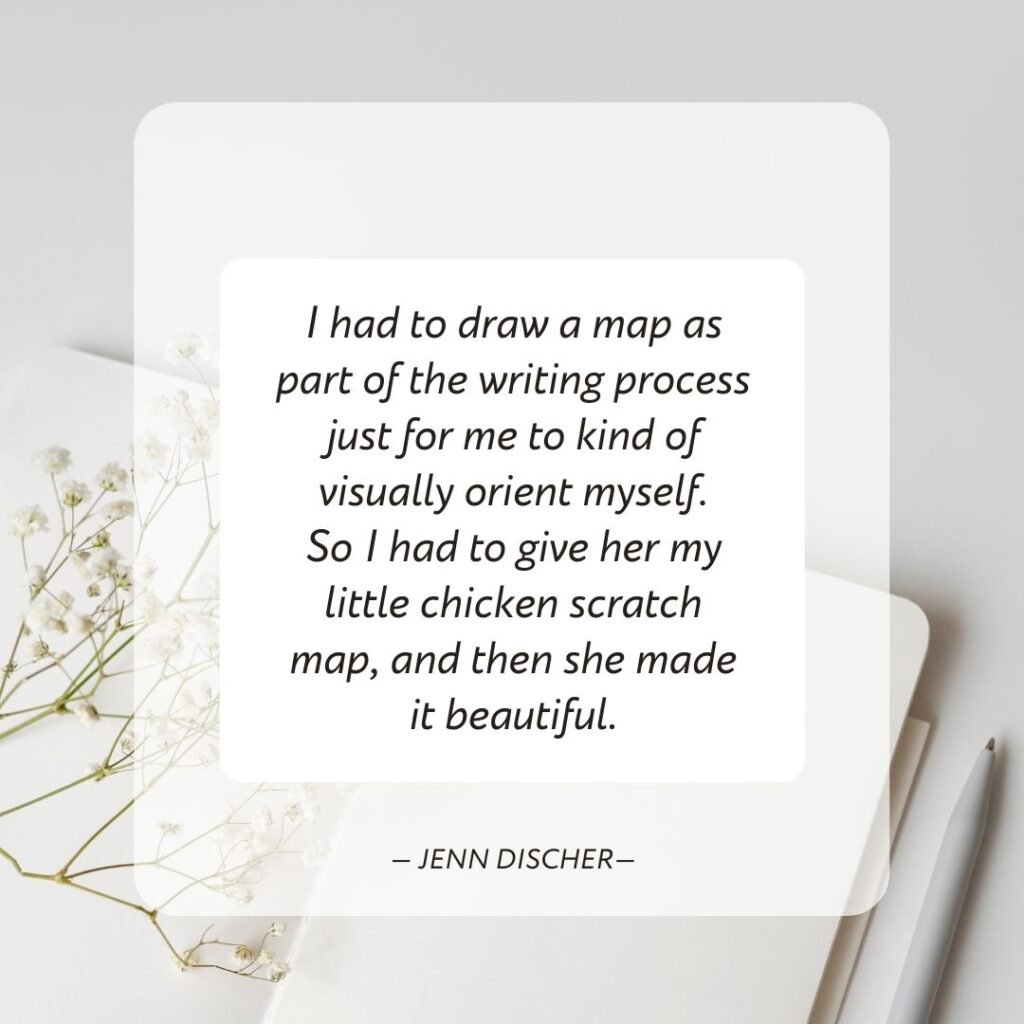
Melissa: I wondered what the process of story boarding, story mapping, was like for you. Because I’ve seen some author friends with their… I mean, it can be really intense. The notecards and the white boards, and just all these files of… yeah, sometimes chicken scratch, sometimes really intricate family trees written out.
Jenn: yes, yes.
Melissa: what has that part been like for you?
Jenn: yeah, so I don’t know that it’s anything I would recommend to someone else. I was just figuring it out as I went. But yes, family trees, multiple family trees, maps, calendars, timelines, sketches of rooms – like, real rough sketches of rooms to orient where everything was, sketches of buildings. Yeah. A lot of… distances. Things that maybe nobody else would pick up or I didn’t even need to be explicit about in the book, but I needed to know in order to reference and have it feel real. I mean, there’s always, you know… it’s not, the map’s not to scale, there’s things that aren’t really to scale so to speak. But in order to have there be a reasonable, you know, for it to feel reasonable, I felt like I needed to know those things.
Melissa: yeah. Where do you store all that stuff? I mean…
Jenn: yeah, in a binder.
Melissa: okay.
Jenn: it probably should be more organized than it is. I have napkins from coffee shops! But it’s just, it’s all there. [laughter]
Melissa: a binder actually… because I was envisioning like, okay, a cardboard box, or an accordion file… a binder sounds like a really good, easy reference just to flip through to find what you need to answer your question.
Jenn: yes, oh, and spreadsheets too. Yeah. Spreadsheets of characters.
Melissa: and would that also be stored digitally so you could look it up digitally?
Jenn: yeah, it’s not technically in the binder, but it probably should be.
Melissa: but having both is probably great.
Jenn: yeah.
Melissa: I love that. So… asking for a friend… ahem. Then, your tips that you might offer to a similarly busy homeschool mama with unique interests to pursue in little off-moments… would be things like getting it scheduled or going to a coffee shop? What else do you have as tips for my friend? [chuckle]
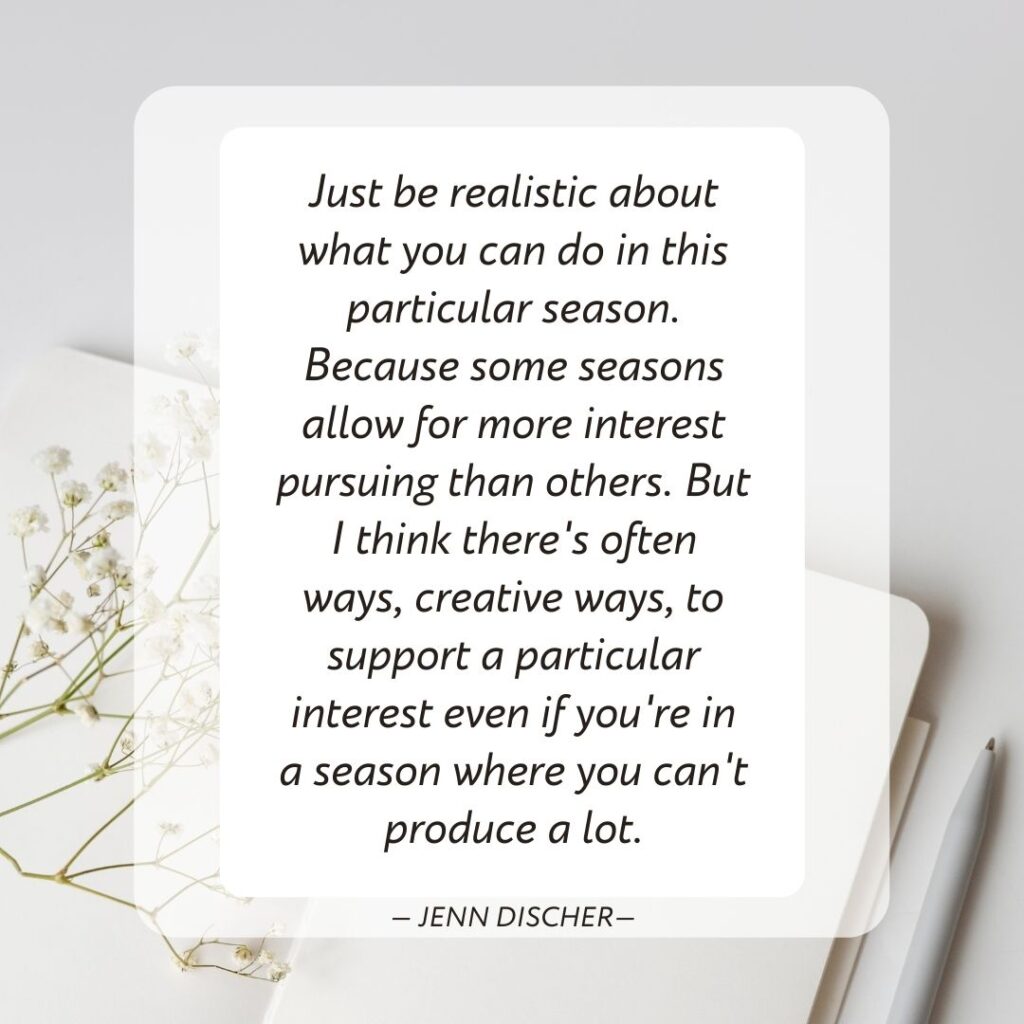
Jenn: yes! yeah. So probably to check in with, if there, you know, if you have a husband… him first about those interests. Just kind of to be able to collaborate there and to think holistically about your family and the season that you’re in, and the calendar, and see if you can come up with a plan to work in time for that amidst the family schedule maybe. That would probably be where I’d start. And then just to be realistic about what you can do in this particular season. Because some seasons allow for more interest pursuing than others. But I think there’s probably, there’s often ways, creative ways, to support a particular interest even if you’re in a season where you can’t produce a lot. So, you know, when there’s a new baby or a sick child or a family member living with you or you’ve just moved… or all these, the myriad of, you know, things that are unexpected or just transition times. You might not have a lot of margin for producing something then, whether it’s writing or knitting or whatever creative endeavor… or maybe not creative endeavor, you know, maybe it’s a particular form of exercise or whatever. But I think there can still be maybe that could be a season for more, for consuming about that particular topic. I mean, I don’t know. I’m spitballing here, but if it were, if it were writing for example, there could be a time, that could be a time of consuming good stories or helpful books on writing maybe in the form of audiobooks, or reading to your children. That kind of fueling the leaf mold of the mind kind of thing is going to help when you do have margin to produce. And then just living life, going on adventures, paying attention to the world around you, to what God is doing, I think can be fuel for bigger writing projects later on. And again, I’m speaking specifically there of writing but I think the principles could translate to other interests. I think not despising small windows of time, because they do add up. Ten minutes here and there is better than nothing, especially if you, you know, have your whatever paraphernalia you need for that particular interest kind of on the ready. Like if you have your knitting in the basket here next to the couch where you know you’re going to be sitting down with the baby on the mat or whatever, or I had a writer friend say, you know, always keep your laptop open on the kitchen counter so you can just type as you walk by, like oh here’s a note I want to write down. Tips like that. I think, talking to other people who have maybe that particular interest, and who might be in that same season of life is super helpful. I’m part of an online writing group, and it’s been helpful to see other peoples’ writing routines, what they do, and they’re really different. I mean, some people can only go write like once a week, that’s what their schedule allows for, but they go take like a six hour block of time. Other people are doing it every day really consistently. I think it’s just going to really vary, depending on your family dynamics and the season of life that you’re in. But if it is something, especially that you know the Lord’s put on your heart or that you are particularly, you know, really interested in or potentially gifted in or want to pursue, I think, just looking for those opportunities. And be willing to be flexible, and just kind of seize them when they come. I’m not naturally flexible. I want things to be a certain way, and this really, this process was super good for me to kind of break a lot of that off because I had to just take what I could get and embrace it. And I couldn’t, really, I had to be pretty diligent with the time that I did have, because time was a rare commodity. Like I just had to use what I had. Yeah.
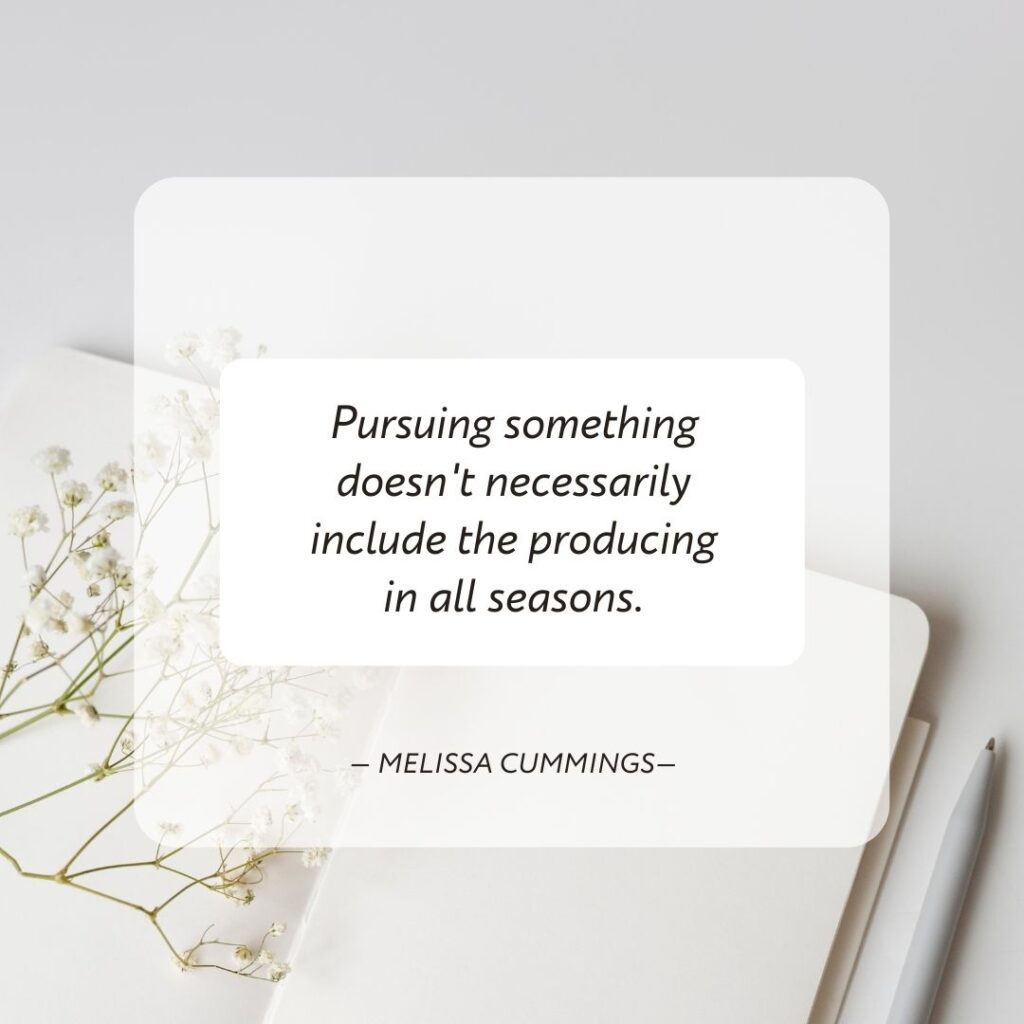
Melissa: I really like that distinction of pursuing an interest versus producing something from that interest. I feel like there needs to be a bumper sticker or a water bottle sticker with that sentiment on it that I can look at regularly. Because that’s, that’s a really helpful way to look at that. I’m going to be pondering that. Pursuing something doesn’t necessarily include the producing in all seasons. Oh, because there’s the physical time but then also the mental capacity. So even when I do have maybe a physical time that’s open, the mental capacity for a particular interest… maybe writer’s block? Maybe that would be an example of what I’m trying to articulate.
Jenn: and there’s time, I mean, when you’re doing physical tasks like homemaking tasks, you can be thinking about the particular project or the particular interest, too. That that time could be spent like brainstorming for that. Or, I think thinking of our… all these interests too, in light of using them to bless our families first or, and then our communities, or just these concentric circles – that’s been really helpful to me. That idea of just being willing to use your gifts in a hidden way to bless your people. I’ve really, I’ve been chewing on that for years. That’s a, probably an idea I got from that Edith Schaeffer book, The Hidden Art of Homemaking. But I love the particular example that I often think of that I think is an example of that is Tolkien’s Letters to Father Christmas. That he, he wrote these letters to his kids from Father Christmas, from, I think it started around 1920, with his first son – and they’re so intricate! I mean, he’s pretending to be Father Christmas, writing in different languages, different, he’s drawing drawings, he’s writing clever stories, he’s got all these characters… and you can see in them, like, glimpses of you know Middle Earth, like the kinds of drawings that are actually in his books… and nobody was ever, I mean, they, people… we can see them now because they’re published but I’m sure he had no thought of them ever being published. And he did this for all his kids for over a decade, and I love that! Because he was using his gifts to bless his kids, to delight them. And I want to have that in the forefront of my mind as I’m writing. Like I want to delight, bless my kids with my stories.
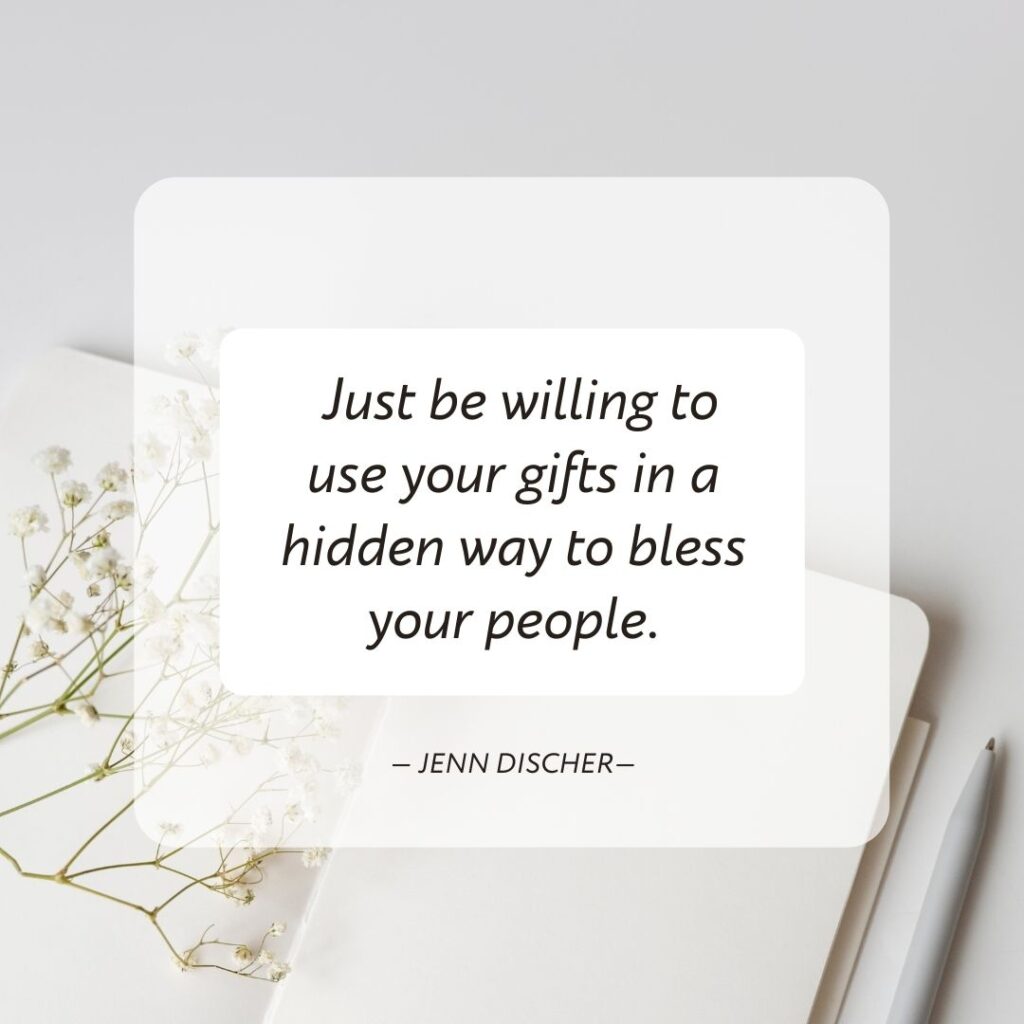
Melissa: so good. How about a quickfire of the silly questions?
Jenn: yes!
Melissa: where did you do most of your writing?
Jenn: our schoolroom table.
Melissa: what did you drink most often while you wrote?
Jenn: black coffee or Good Earth sweet and spicy tea.
Melissa: hot or cold?
Jenn: hot.
Melissa: what is your favorite quote from the book?
Jenn: oh, I have a few!
Melissa: it’s like asking you to pick a favorite child, I know.
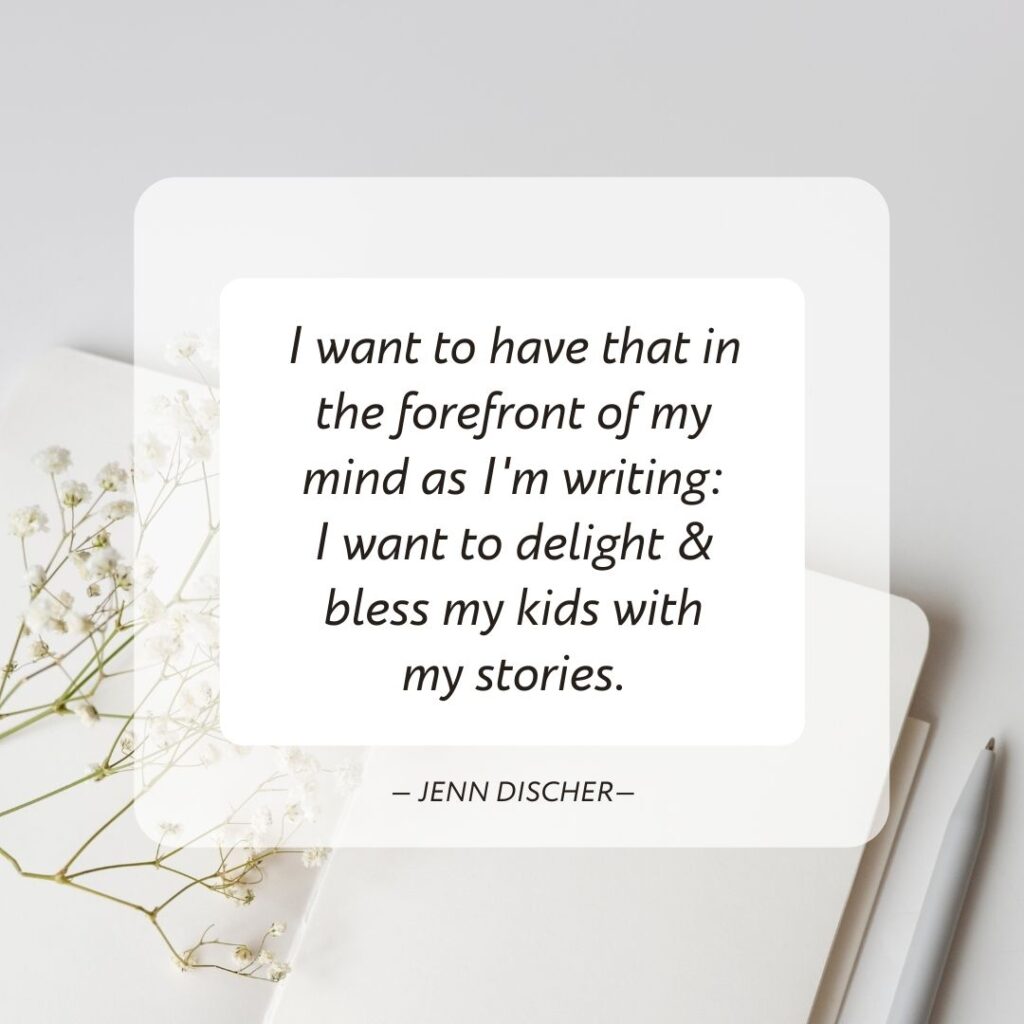
Jenn: yeah! There’s… and probably the ones that stick with me are the parental ones, the ones spoken by the parents in the story. But there’s one where the king is saying to his son that the king’s mantle has a way of making the wearer ready. Like even if you don’t feel ready for something, like the very act of being called, you will be enabled for the task at the right time. I guess that sentiment is what’s behind that. And I didn’t give you an exact quote, so sorry. [laughter]
Melissa: well that’s because we need to read! We need to read the book to find it. It’s like a treasure hunt.
Jenn: yeah, aw.
Melissa: now when I go back to reread it with my kids, when I find that, I’m gonna book dart it.
Jenn: yeah!
Melissa: is there a moment in the process that would stand out to you as most remarkable?
Jenn: yes. After publishing it, having kids, hearing kids say that they love the book or that they really, you know, love a certain character. That’s just really surreal and an honor, and just makes me so happy. It’s really, it’s really great.
Melissa: so what’s next?
Jenn: getting my house in order! [laughter] I mean, the last couple months have been a more full season, and so with, you know, launching it. And so I’m backlogged on house projects and family photo albums and things like that. But I would, once I kind of get life on the rails there, I’d like to, I need to start working on Book Two.
Melissa: how about with The Elk King? Are you doing promotional things? Are you, will you take it to local bookshops and ask for… I don’t know… them to carry it and you could do an event? I mean, what does that look like?
Jenn: yeah. So sorry, I did jump ahead to Book Two mentally, but yes. There is some of that going on. I’m gonna go a sweet author event in a couple weeks with a local homeschool group, kind of like an author Q and A, especially geared toward kids who might want to write themselves, or who already are writing. Kind of like a young writer’s thing. Which I’m really looking forward to, I love those conversations. That’s been one of my favorite things actually also about the book, is it’s generated some of those conversations naturally just with kids I know. And yes, I’ve been chatting with local bookshop owners, and have, I would love to do a local, like a bigger local book signing. Like author event, book signing, kind of celebratory thing. That’s in the works too.
Melissa: and do you have people… do you have tips for people as far as how to get it requested by a library or that kind of thing? Is that a…
Jenn: yeah, actually. So because I do this with my library all the time actually, I’m always requesting that my library buy certain books.
Melissa: yeah, same.
Jenn: yeah, I just, that’s just kind of a habit for me. So it’s usually pretty easy, you know. If it’s not clear on their library’s website, you could ask a librarian and they’ll usually very kindly walk you through the process. My library happens to be really fast about it, they’re really, they let you request three books a month, and they have really fast turnaround on purchasing them. Which is really, really great. So yeah, if you find yourself, you’re interested in getting the book but you’re in the place where you can’t really, you know, you can’t buy it, don’t want to buy it, then asking your library to buy it would be great. And then it’s accessible to any number of kids for free.
Melissa: we can get it on Amazon, I know, because that’s where I got mind.
Jenn: yep, yep. Right now it’s Amazon. Ebook or a paperback, either is great, I probably prefer the paperback but both have their benefits. I have both. And then potentially local bookshops, that’s TBD.
Melissa: mhmm. And where can we find you on the internet with all these things?
Jenn: yes. So I do have a website, it’s JennDischer.com Jenn with two n’s. And you can get the free coloring sheet there, it’s a free download. And then on Instagram @JennDischer and Facebook as well. Yeah, thank you.
Melissa: well, in the midst of all that is on your plate, both cultures you’re pursuing right now, I’m so honored that you would just be able to carve out time to have a chat with me this morning and to celebrate The Elk King! I just, I can’t get over… I mean, it hasn’t been that many months that I’ve known about it, but just seeing that come to fruition from a distance has been delightful. And I’m, I’m so happy for you! And happy for the kids in this upcoming generation that they get to have these kinds of stories to grow with and to learn from. It’s just beautiful.
Jenn: thank you, Melissa. Thanks so much for having me, I really appreciate it.
Melissa: well I’m looking forward to chatting again soon, actually.
Jenn: yes, I would love that.
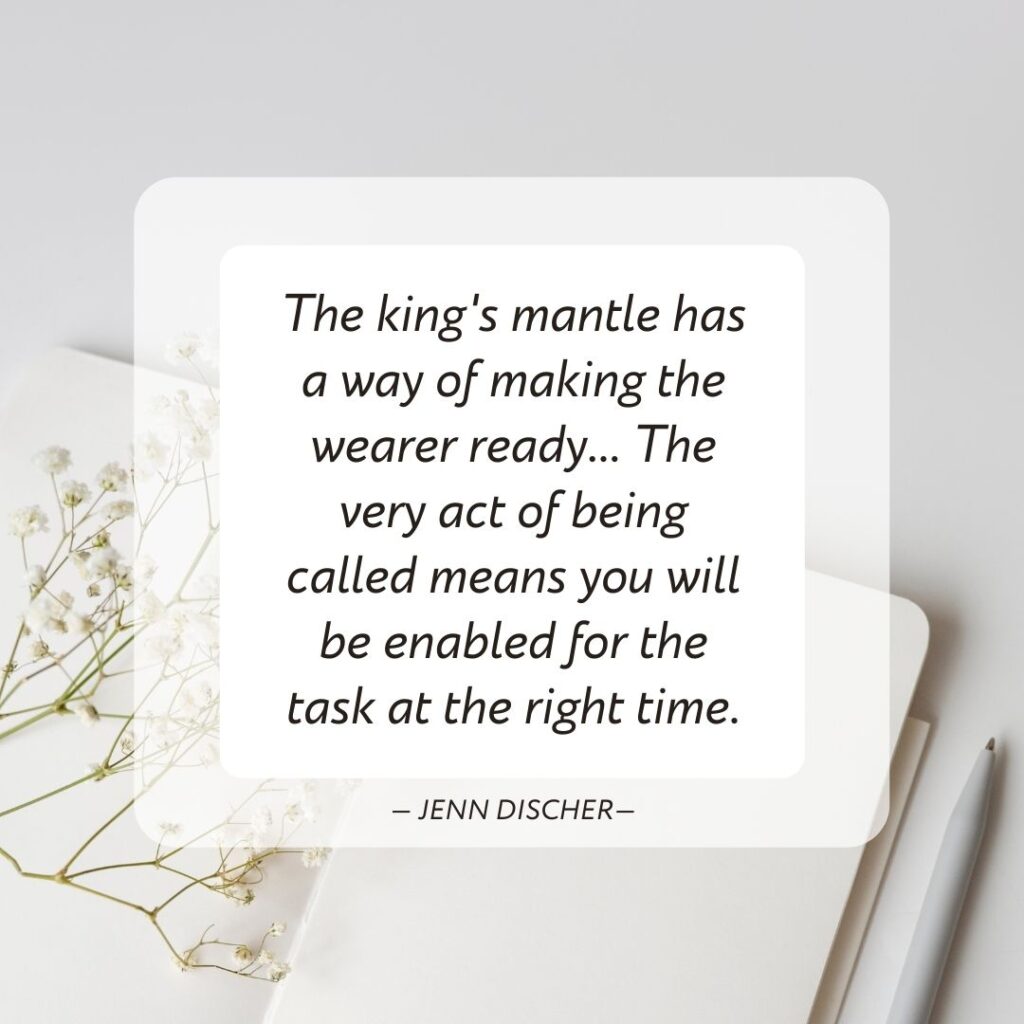
Melissa: and I was also thinking, the scarf…
Jenn: yes! The king’s mantle! That’s another cultural thing, right? Yes.
Melissa: right there. Oh, see. You’ve been talking about knitting, you’ve used that as an example.
Jenn: yes, I don’t, I want to knit. So that’s an interest I’d like to pursue. I would like to pursue knitting! I have not had margin for it. Or I have not made, created the time. Taken the time.
Melissa: I thought, wow, there needs to be a pattern for that! And that would be a… [laughter]
Jenn: yes, yes! Well there are these four clans in Glenariff, so it’s all the colors from all the clans, are in the king’s mantle.
Melissa: again sort of pulling from that Celtic or Scottish little bit there. Maybe Nordic people do that as well, but
Jenn: yeah, it is definitely more Celtic than anything.
Melissa: yeah, I love it. Well thank you for taking the time to answer all my questions about the book and the culture.
Jenn: thank you! My pleasure. It was a treat for me to like, to just kind of reflect on the process.
Melissa: yeah, well, I’m glad it was a treat for you because it was definitely a treat for me. All right, let’s talk again soon, friend. God bless you.
Jenn: aw, okay, I would love that. Okay. You too, bye bye.
Melissa: bye!
Elk Prince Draven will inherit the throne of peaceful, prosperous Glenariff much sooner than he’d like. He doubts he’d make a very good king and just wants a normal life. But in Glenariff no elk is normal. All are bound to the magical source of the herd’s strength. Like many, Draven has forgotten the old tales and old enemies. As Draven makes plans to escape royal life, a deadly sickness sweeps the kingdom. Rumors of enemies and traitors abound. With the king distracted by secret troubles, the elk stand to lose everything, including their very lives. To save the kingdom, Draven must face what he has long feared, and new terrors he could not have imagined. But first he must remember the old tales, before there’s no herd left to rule.
And that brings today’s conversation to a close. You can find more conversations on paideia at PaideiaNorthwest.com and PaideiaSoutheast.com for more resources and practical encouragement. Join me again next time for another paideia conversation. And in the meantime, peace be with you.
